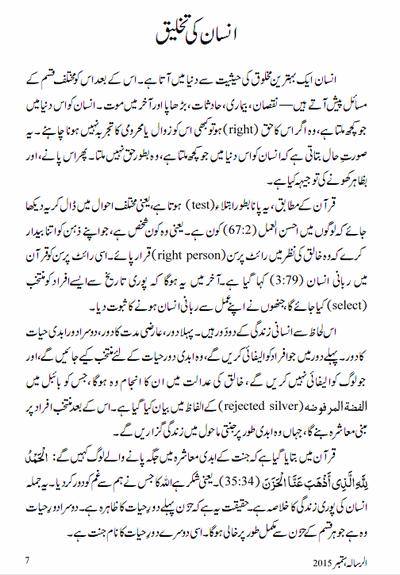
Insan Ki Takhleeq
Forgiving Nature of The Prophet
One of the great qualities of Prophet Muhammad (peace be upon him) was that he never took revenge on anyone for personal reasons and always forgave even his firm enemies. His wife `Aishah reported that Allah s Messenger was not unseemly or obscene in his speech, nor was he loud-voiced in the streets, nor did he return evil for evil, but he would forgive and pardon. The people of the Quraysh rebuked him, taunted and mocked him, beat him, and abused him. They tried to kill him and when he left for Madinah, they waged many wars against him. Yet when he entered Makkah victorious with an army of 10,000, he did not take revenge on anyone. He forgave all. Even his deadliest enemy, Abu Sufyan, who had fought so many battles against him, was forgiven, as was anyone who stayed in his house.
Prophet Muhammad (peace be upon him) also pardoned the leaders of Ta’if, who had engaged ruffians to pelt him with stones when he visited that town to invite them to Islam.
Abdullah Ibn Ubayy, the leader of the hypocrites of Madinah, worked all his life against Prophet Muhammad (peace be upon him) and Islam and left no stone unturned in trying to defeat his mission. He withdrew his 300 supporters in the Battle of Uhud, which almost broke the backbone of the Muslims. He engaged in intrigues and acts of hostility against the Prophet of Islam and the Muslims.
An Abyssinian slave who had killed Prophet Muhammad s (peace be upon him) beloved uncle Hamzah in the Battle of Uhud was also forgiven when he embraced Islam after the Conquest of Makkah. The wife of Abu Sufyan, who had cut open Hamzah’s chest and torn his liver and heart into pieces in the Battle of Uhud, quietly came to the Prophet (peace be upon him) and accepted Islam. He recognized her but did not say anything. She was so impressed by his magnanimity and stature that she said, O Allah s Messenger, no tent was more deserted in my eyes than yours; but today no tent is dearer in my eyes than yours.
Habar Ibn Al-Aswad was another vicious enemy of Prophet Muhammad (peace be upon him) and of Islam. He had inflicted a grievous injury on Zaynab, daughter of the Prophet (peace be upon him). She was pregnant when she emigrated from Makkah to Madinah. The polytheists of Makkah obstructed her and Habar Ibn Al-Aswad intentionally threw her down from the camel. She was badly hurt and miscarried as a result. Habar committed many other crimes as well. He wanted to run away to Persia but then he came to Prophet Muhammad (peace be upon him), who forgave him.
Prophet Muhammad (peace be upon him) was all for forgiveness and no amount of crime or aggression against him was too great to be forgiven by him. He was a complete example of forgiveness and kindness.
He always repelled evil with good, for, in his view, an antidote was better than poison. He believed and practiced the precept that love could foil hatred and aggression could be won over by forgiveness. He overcame the ignorance of the people with the knowledge of Islam, and the folly and evil of the people with his kind and forgiving treatment.
With his forgiveness, he freed people from the bondage of sin and crime and also made them great friends of Islam. He was an exact image of the following verse of the Qur’an: The good deed and the evil deed cannot be equal. Repel (the evil) with what is better (i.e. Allah orders the faithful believers to be patient in the time of anger, and to excuse those who treat them badly) then verily he, between whom and you there was enmity, (will become) as though he was a close friend (Fussilat 41:34).
- November, 3
- 3245
- Prophet Character
- More
With A Foot In The Grave
The skin has wrinkled, the bones have softened, and the hair is colored, yet the enthusiasm for sins, the pleasure of disobedience, and the neglect of the hereafter have not dwindled. This is our state – the uncles of the Muslim Ummah.
It is quite saddening to note that despite the reality dawning upon us with every passing day, we do not stop to reflect on what answer we will have when we return to Allah. Elderly Muslims today – men and women – have so much time to kill in Haraam activities than do anything useful at all.
Oh, but the television shows have to be religiously followed! The latest movies, the new controversies in the media, the year-long sports events, the celebrity news, and (how can one forget) the gossip and backbiting all need our time!
Unfortunately, we are drowned in sins. And to add to that we constantly backbite to destroy whatever negligible good deeds we have.
The companion Amr Bin Al-As said, “…I am amazed at one who spots an impurity in the eye of another but is unable to detect it in his/her own eye, or who attempts to remove a grudge from another’s heart while making no attempt to remove grudges from his/her own heart…” (Al-Bukhari, Book of Manners, no. 1295)
Just as this article is being read, innumerable number of people would be breathing their last. If today we were to be called into account for what we have done, what would be our state? How prepared are we? Are we actually worrying about our own future and working towards making Jannah our goal?
Performing Wudu For Your Daily Prayers
- Niyyat – Make an intention to perform Wudu in one’s mind for the purpose of worshipping Allah Subhanahu wa ta’ala.
- Bismillah – Invoking Allah at the start of Wudu by saying Bismillah (in the Name of Allah)
- Hands – Wash the hands 3 times up to the wrists with water, allowing water to run between the fingers.
- Mouth – Rinsing the mouth with water three times. The mouth must be empty of food.
- Nose – Cleaning one’s nostrils by sniffing water in and then out 3 times.
- Face – Clean the face 3 times from the top of the forehead down to the chin and from ear to ear.
- Arms – Wash the arms three times, from the elbows. Right arm first, then left.
- Head – Moisten the hands and pass them over the head from the forehead to the back of the neck (over the head), and from there back to the forehead. Never wet the neck. Then wipe the earlobes with the fore-fingers cleaning the inside of the ears and the thumbs cleaning the external side.
- Feet – Finally wash both feet beginning with the right first, up to the ankles. The feet should be rubbed while washed and water must run between the toes. No part of the foot remains dry.
Shaheed-E-Minbar-O-Mehrab

Shaheed-E-Minbar-O-Mehrab
Serving The Interests Of The Community
Among all the wives of the Prophet (peace be upon him), Umm Salamah (radiAllahu anha) was perhaps the one who was most sensitive to the interests of the community. She shared the hopes and difficulties of her fellow Muslims at both the individual and the community levels. We saw how she expressed their feelings to the Prophet when the Muslims were told that they could not go to Makkah for their worship rituals and had to return home. Her advice to the Prophet on that day took away all the strain and ensured their compliance with his orders.
After the Tabuk expedition, a few Muslims who did not join the Muslim army tied themselves up in the mosque, as a sign of repentance. They were untied when it was time for prayer, and then they tied themselves up again when the obligatory prayer had finished. They were uncertain about what judgment was to be made in their cases. Their self-imposed restraint was a gesture of their repentance. One of them was Abu Lubabah (Radi Allahu Anhu).
As the Prophet was at Umm Salamah’s home one night, just before the dawn prayer, he received revelations that included the Verse that says: “There are others who have acknowledged their sins, after having mixed righteous deeds with evil ones. It may well be that God will accept their repentance. God is Much-Forgiving, Ever-Merciful.” (9: 102)
The Prophet smiled and Umm Salamah (radiAllahu anha) asked him why he smiled. He said: “God has accepted Abu Lubabah’s repentance.” She asked him: “May I be the one who gives him the good news?”
She opened her door and looked inside the mosque. She said: “Abu Lubabah! Rejoice, for God has accepted your repentance.” Some people rushed to release him, but he refused, saying that he would beg them not to do so, for he wanted the Prophet to release him. We see how she was so pleased for someone who was totally unrelated to her. She shared his joy at the happy news.
Many years later, when the Muslim community went through the very difficult days that saw the assassination of the third Caliph, Uthman (Radi Allahu Anhu), and a serious split in the community, another wife of the Prophet, Ayesha (radiAllahu anha), was about to leave Madinah, marching at the head of an army that sought to gather support for their stand.
Umm Salamah objected to this attitude. She went to Ayesha (radiAllahu anha) and counseled her against going. She said it was wrong for a widow of the Prophet to embark on such a course of action.
As for her own position in those days, she was totally supportive of Ali (Radi Allahu Anhu), the fourth Caliph. She went to him and said: “I would have joined your army, but I know that such an action would be in disobedience of God’s orders and I believe you would not accept it from me. However, this is my son, Omar. He is dearer to me than my own life. He will join you and will fight for your cause.”
Her position then was characteristic of the great insight that enabled her to gauge what best served the interests of the Muslim community.
Umm Salamah (radiAllahu anha) lived long after the Prophet. In fact, she was the last of the Prophet’s wives to die. Her death took place in the year 61, and she was buried at Al-Baqee, the burial place of many of the Prophet’s companions in Madinah.
By: Adil Salahi
Life Without Tolerance
Life without tolerance becomes a living hell because everybody will be biased against other religions, races, nationalities, cultures, classes, and points of view. Islam has paid due attention to this issue realizing how vital it is in the life of any society. In this article, I shall try to shed some light on this issue in light of the Holy Qur’an and Sunnah.
Prophet Muhammad (peace be upon him) was the ideal example of tolerance. He taught his Companions to respect human beings regardless of their religion, race, color, language…etc. and this is one of the characteristics that made people embrace Islam through its long history.
One of those who recently embraced Islam said that what it so attractive about Islam is that it accepts the other, although the other does not usually accept it for no logical reason.
He noticed that Muslims are ordered to believe in all the Holy Books and all Prophets and Messengers and honor them, “The Apostle believes in what has been revealed to him from his Lord, as do the men of faith. Each one (of them) believes in God, His angels, His books, and His apostles. “We make no distinction (they say) between one and another of His apostles.” And they say: “We hear, and we obey: (We seek) Your forgiveness, our Lord, and to You is the return of all.” (Qur’an, 2:285)
When Prophet Muhammad (peace be upon him) migrated to Madina, he found the Jews inhabiting part of it, he did not expel them from the city. Instead, Prophet Muhammad (peace be upon him) signed a treaty with them giving them the right to live in it peacefully, but they as usual did not abide by the treaty. The Prophet (peace be upon him) also used to receive delegations belonging to other religions like Christianity, dealing with them with due respect and courtesy.
Also, we must realize that people are of different natures and backgrounds, cultures and languages and this is one of the norms of nature. This is clearly stated in the Holy Qur’an, “O mankind! We created you from a single (pair) of a male and a female, and made you into nations and tribes, that you may know each other (not that you may despise (each other). Verily the most honored of you in the sight of Allah is (he who is) the most righteous of you. And Allah has full knowledge and is well acquainted (with all things).” (Qur’an, 49:13)
- October, 28
- 3514
- Human Rights
- More
Birr (Piety) Towards Parents After Death
Death brings an end to one’s ability to perform good deeds and it is a long journey that requires enough provisions and only three qualities can make this journey easier. Allah’s Messenger (sallallahu alaihi wa-sallam) said: “When a man dies all his good deeds end, except for three cases; the charity of continuous blessings, beneficial knowledge that he left behind, and a righteous child who prays for him.” [Saheeh Muslim (vol. 3, p.867, no. 4005)]
Allah’s Messenger (sallallahu alaihi wa-sallam) explained how a child can benefit his parents after their death. Narrated Abu Usayd Malik ibn Rabiah as-Saidi: “While we were with the Messenger of Allah (sallallahu alaihi wa-sallam), a man of Banu Salmah came to him and said: ‘O Messenger of Allah, is there any kindness left that I can do to my parents after their death?’ He replied: “Yes, there are four qualities to perform:-
1. Pray (to Allah to grant them mercy) and invoke (Him) to forgive them,
2. Fulfill their promises (or will),
3. Be generous to their friends,
4. Keep relations with the kindred, which you are kindred through your parents. This is what remains of the kindness that you could perform towards them after they die.” [Sunan of Abu-Dawood (5123)]
Note: The last wishes (wasiyah or will) expressed by the person should be fulfilled so long as they are in accordance with the Sharee’ah.
Performing Hajj on behalf of the Dead:
Another form of worship known from the Sunnah that can be performed on behalf of the dead is Hajj (Pilgrimage). Hajj can only be performed on behalf of the dead after completing one’s obligation of performing Hajj. It was narrated from Ibn Abbas that the Messenger of Allah (sallallahu alaihi wa-sallam) heard a man saying “Labbayka ‘an Shubrumah (At your service, O Allah, on behalf of Shubrumah).” The Messenger of Allah (sallallahu alaihi wa-sallam) asked: “Who is Shubrumah?” He said, “A relative of mine.” The Prophet (sallallahu alaihi wa-sallam) said, “Have you ever done Hajj before?” He replied: “No.” Allah’s Messenger (sallallahu alaihi wa-sallam) ordered him, “Do this Hajj for yourself, then do Hajj on behalf of Shubrumah.” [Abu Dawood (1811). The hadeeth is classed as Saheeh by Shaikh al-Albanee in Irwaa’ al-Ghaleel (4/171)]
- October, 27
- 4063
- Human Rights
- More
Bemari Ka Bayan
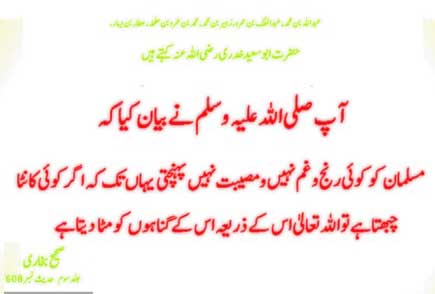
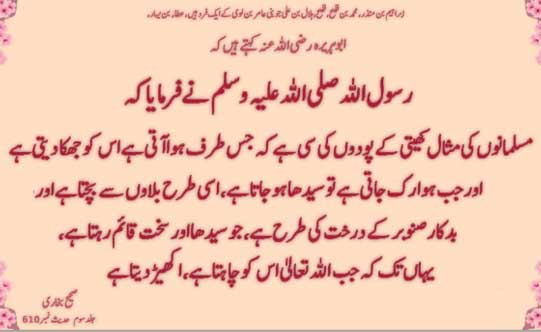
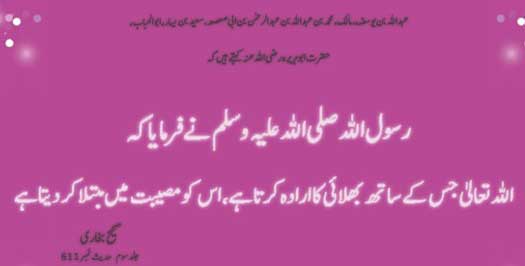
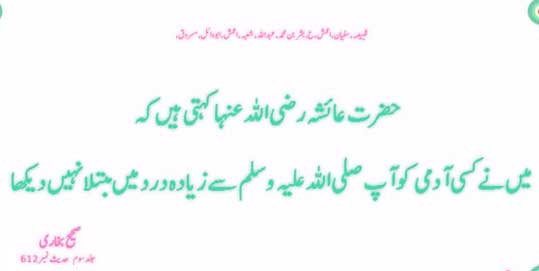
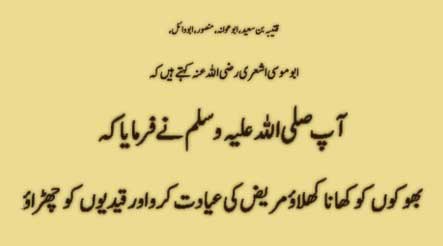
Bemari Ka Bayan
Five Things About The Holy Qur’an
1. The original usage of the word “Qur’an” itself, where it occurs about 70 times assuming various meanings. It is a verbal noun of the Arabic verb “Qara’a”, meaning “he heard” or “he recited”. Its liturgical context is seen in several passages, for example: “So that when Al Qur’an is recited, listen to it & keep silent“. The term also has closely related synonyms which are employed throughout the Qur’an. Each of the synonyms possesses its distinct meaning. Such terms include “kitab” (book); “ayah” (sign); & “surah” (chapter). Other related words are: “dhikr”, meaning “remembrance”, & “hikma” meaning “wisdom”.
2. The Qur’an consists of 114 chapters of varying lengths; each known as surah. Each chapter has a title: usually, a word is mentioned within the chapter itself. In general, the longer chapters appear earlier in the Qur’an, while the shorter ones appear later. As such, the arrangement is not connected to the sequence of revelation. Each chapter commences with “Bismillahir Rahmanir Rahim”, an Arabic phrase meaning “In the name of God, Most Gracious, Most Merciful”, with the exception of the ninth chapter.
3. Scribes wrote down the Qur’an, according to the order of the Prophet Muhammad (peace be upon him), on pieces of cloth, leather, bones, & stones. Its verses were ordered & arranged according to Allah’s inspiration. In the beginning, it was not gathered in one book. Some of the Prophet’s companions wrote parts & Surahs especially for themselves after they had memorized it from the Prophet. Zaid Ibn Thabit gathered the Qur’an in one book. He was tasked to do this by Abu Bakr Al-Siddiq, according to advice from Umar Ibn Khattab. Its resource was the parts written by the scribes; so he gathered all of it in one book, The Holy Qur’an.
4. Dots were put as syntactical marks by Abu Al-Aswad Al-Doaly, during the time of Mu’awiya Ibn Abi Sufyan (661-680 CE). The letters were marked with different dotting by Nasr Ibn Asem & Hayy Ibn Ya’amor, during the time of Abd Al- Malik Ibn Marwan (685-705 CE). A complete system of diacritical marks (damma, fataha, kasra) was invented by Al-Khaleel Ibn Ahmad Al-Faraheedy (d. 786 CE).
5. With the necessity to record the Holy Qur’an in the clear and readable text; the Arabic scripts developed into what is now considered the two most important classical styles of calligraphy: Kufic and Naskh. Kufic and Naskh are broad generic terms covering a plethora of magnificent styles in Arabic calligraphy, and are not, of course entirely inclusive of the numerous variations and nuances of the different styles of script, some of which were of key importance in the establishment of the classical trends and styles in the noble art of Arabic calligraphy.

